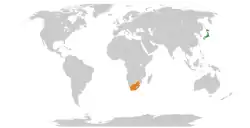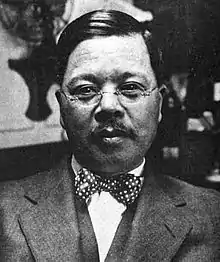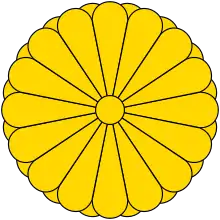Japan–South Africa relations
Japan–South Africa relations refers to the current and historical bilateral relationship between Japan and South Africa.
 | |
Japan |
South Africa |
|---|---|
History
The genesis of trade relations between Japan and the future South Africa date to 1643 when Jan van Riebeeck first arrived at Dejima in Nagasaki harbor. Reebeck accompanied Jan van Elseracq, who was the representative of the Dutch East Indies Company (VOC) in Japan. Seven years later in 1650, Riebeck proposed selling hides of South African wild animals to Japan.[1]

In 1898, Furuya Komahei was the first Japanese businessman to open a shop in South Africa. The Cape Town store was called Mikado Shōten (Emperor Shop). It stayed open until 1942, when it was closed and confiscated by the government.[2]
In 1904, Iwasaki Kanzō's small businesses in Durban were assisted by the Japanese Ministry of Agriculture and Commerce.[3]
Japan opened a consulate in Cape Town in 1918.[4]
Japan began actively trading with South Africa for natural resources since the 1960s, despite international sanctions in response to South Africa's apartheid. As a result, Japanese in South Africa were granted the honorary white status, much to the complaint of South African opposition party politicians and the press which questioned why the Japanese were granted special privileges.[5] In addition, Japan's support and passive posture toward white minority rule brought about criticism from other African nations. In 1983, Tanzanian Ambassador to Japan, Ahmed Hassan Diria, pointed out that profits generated from Japanese tourists visiting South Africa helped strengthen apartheid.[6]
Since 1994, greater co-operation between Japan and South Africa has been limited by domestic bureaucratic and institutional conflicts within both countries.[7]
References
- Osada, Masako. (2002). Sanctions and Honorary Whites: Diplomatic Policies and Economic Realities in Relations Between Japan and South Africa, p. 28.
- Osada, Masako. (2002). p. 30.
- Osada, pp. 30-31.
- Osada, p. 34.
- Afro-Hispanic Review: White, Honorary White, or Non-White: Apartheid Era Constructions of Chinese, Dr. Yoon Jung Park (Univ of Johannesburg), Spring 2008
- Morikawa, https://books.google.com/books?id=GIaMrpC0L4MC p.72
- Alden, Chris. "The Chrysanthemum and the Protea: Reinventing Japanese-South African Relations after Apartheid," African Affairs, Vol. 101, No. 404 (July 2002), pp. 365-386.
External links
- Japan-South Africa Relations at MOFA.go.jp
- Embassy of Japan in South Africa
- The South African Embassy in Japan
